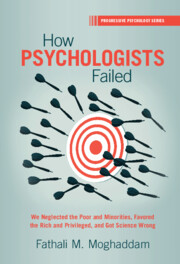 How Psychologists Failed
How Psychologists Failed Book contents
- HOW PSYCHOLOGISTS FAILED
- The Progressive Psychology Book Series
- How Psychologists Failed
- Copyright page
- Dedication
- Contents
- Preface
- Acknowledgments
- Chapter 1 Why We Must Rethink Psychology
- Part I Psychological Processes
- Part II Rethinking Behavior in the Larger World
- Part III Looking Ahead
- Chapter 11 Rethinking Research Methods
- Chapter 12 Revolution and Psychology
- Afterword
- Notes
- References
- Index
Chapter 11 - Rethinking Research Methods
from Part III - Looking Ahead
Published online by Cambridge University Press: 27 October 2022
- HOW PSYCHOLOGISTS FAILED
- The Progressive Psychology Book Series
- How Psychologists Failed
- Copyright page
- Dedication
- Contents
- Preface
- Acknowledgments
- Chapter 1 Why We Must Rethink Psychology
- Part I Psychological Processes
- Part II Rethinking Behavior in the Larger World
- Part III Looking Ahead
- Chapter 11 Rethinking Research Methods
- Chapter 12 Revolution and Psychology
- Afterword
- Notes
- References
- Index
Summary
It is in the domain of research methods that mainstream psychology makes the most direct claim of being an objective science, and it is also in this domain that the nature of psychology as ideology becomes crystal clear. The causal-reductionist model is followed in mainstream research methods, with most research samples being composed of undergraduate students. Ethics in research methods is defined in a narrow and misleading way, with no attention given to the most important issue: the research questions being addressed. The main focus of this narrow ethics is the treatment of individuals in the research process. The relevance of research questions to major issues confronting the poor, the lower-class and minorities is not considered part of ethics. Attempts are made to position psychology as a science that is the 'same as other sciences' such as chemistry and physics, with no consideration for the fact that human beings are different from chemicals and physical objects. Repeated 'crises' in psychology, such as the 'replication crisis,' have not had a serious impact on mainstream psychology. This is because the main function of mainstream psychology is to serve as ideology, in support of the status quo.
Keywords
Information
- Type
- Chapter
- Information
- How Psychologists FailedWe Neglected the Poor and Minorities, Favored the Rich and Privileged, and Got Science Wrong, pp. 145 - 155Publisher: Cambridge University PressPrint publication year: 2022